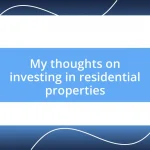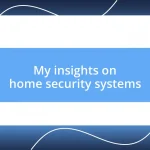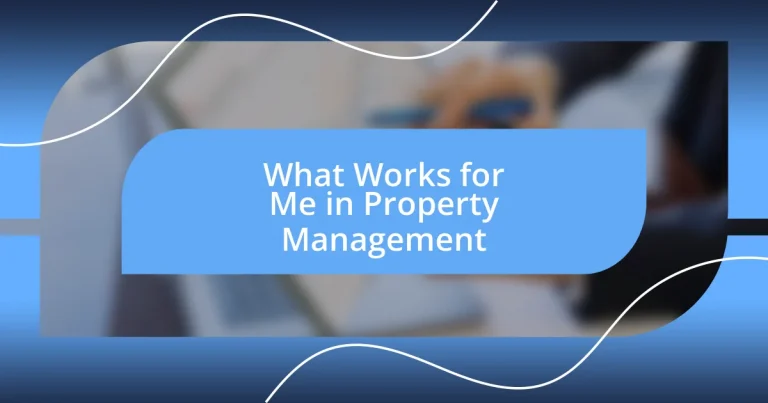Key takeaways:
- Effective communication and organization are essential for maintaining tenant satisfaction and ensuring smooth property management operations.
- Utilizing technology, such as property management software and tenant portals, streamlines processes for maintenance, rent collection, and communication, enhancing overall efficiency.
- Building strong tenant relationships through regular check-ins, community events, and personalized communication fosters loyalty and improves tenant retention.
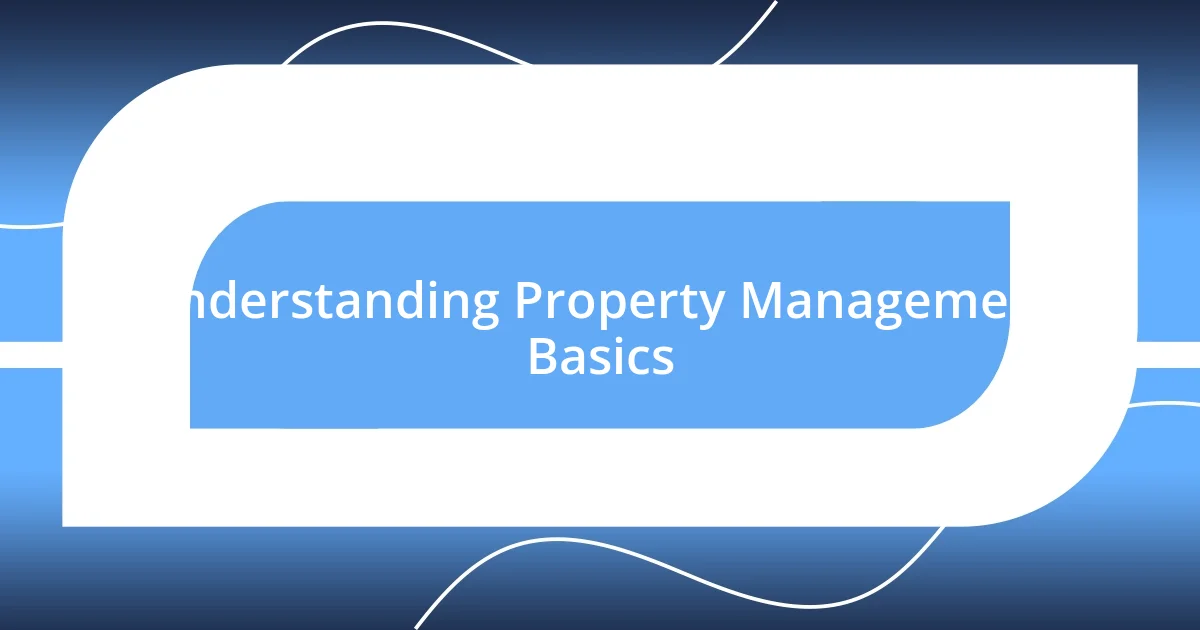
Understanding Property Management Basics
Property management, at its core, is about creating a safe and welcoming environment for tenants while ensuring that owners receive a solid return on their investment. I remember my first experience stepping into property management—it felt overwhelming yet exhilarating. I often wondered how intricate the balance between tenant satisfaction and property upkeep could be. Have you ever thought about this balancing act?
Understanding the basics involves recognizing the key functions—rent collection, maintenance, and tenant relations. For me, effective communication stands out as a critical factor. I learned early on that keeping tenants informed about maintenance schedules or policies can prevent misunderstandings and foster a sense of community. How simple acts can strengthen those relationships!
Moreover, staying organized is crucial. I vividly recall a time when I lost track of a maintenance request, which led to tenant dissatisfaction. Since then, I’ve adopted tools and techniques that help keep everything streamlined. Have you considered how much smoother your operations could be with the right systems in place? It’s the little adjustments that often lead to bigger successes.
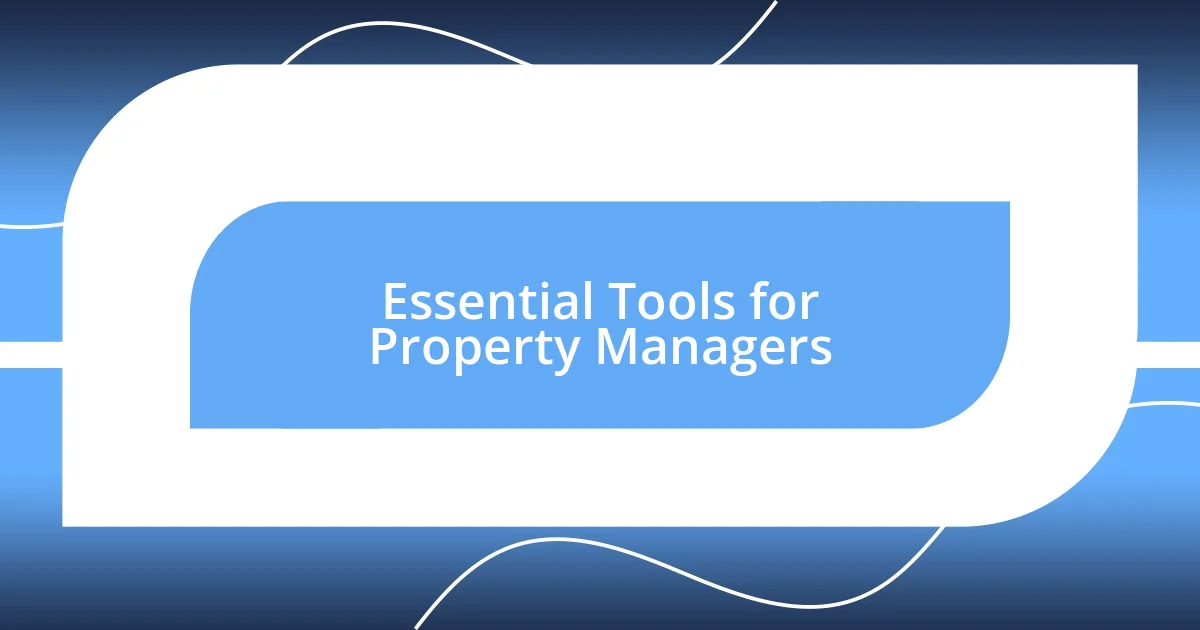
Essential Tools for Property Managers
Staying organized in property management can be a game changer. When I began using property management software, I felt an immense weight lift off my shoulders. You see, before integrating these tools, I often juggled spreadsheets and sticky notes, leading to lost requests and frustrated tenants. Now, everything is streamlined—maintenance requests, lease renewals, and rent payments are all just a click away. Have you ever wished for a simple solution to keep your properties in check? Trust me, the right software can be a lifesaver.
Communication tools are another essential component in my toolkit. I vividly recall a time when I ignored an important communication from a tenant, resulting in a preventable issue that spiraled into a much larger problem. Since then, I’ve embraced platforms that facilitate quick communication, ensuring tenants feel heard and valued. Using messaging apps or tenant portals has transformed how I interact with residents, making me more approachable. Isn’t it refreshing to know that most concerns can be addressed with just a few taps on a keyboard?
Finally, financial management tools play a pivotal role in my property management strategy. In my early days, I struggled to track expenses and income accurately, leading to a chaotic end-of-year process. With dedicated accounting software, I find it much easier to manage my finances, which enhances my budgeting efforts and ultimately boosts my bottom line. Why navigate the complexities of finance alone when reliable tools can guide you? Embracing these essentials not only saves me time but also gives me peace of mind, allowing me to focus on providing great experiences for my tenants.
| Tool Type | Purpose |
|---|---|
| Property Management Software | Streamlines operations, tracks maintenance, and manages tenant communications. |
| Communication Platforms | Facilitates quick interaction with tenants, enhancing relationships and transparency. |
| Financial Management Tools | Helps in tracking expenses and income effectively, simplifying budgeting and reporting. |
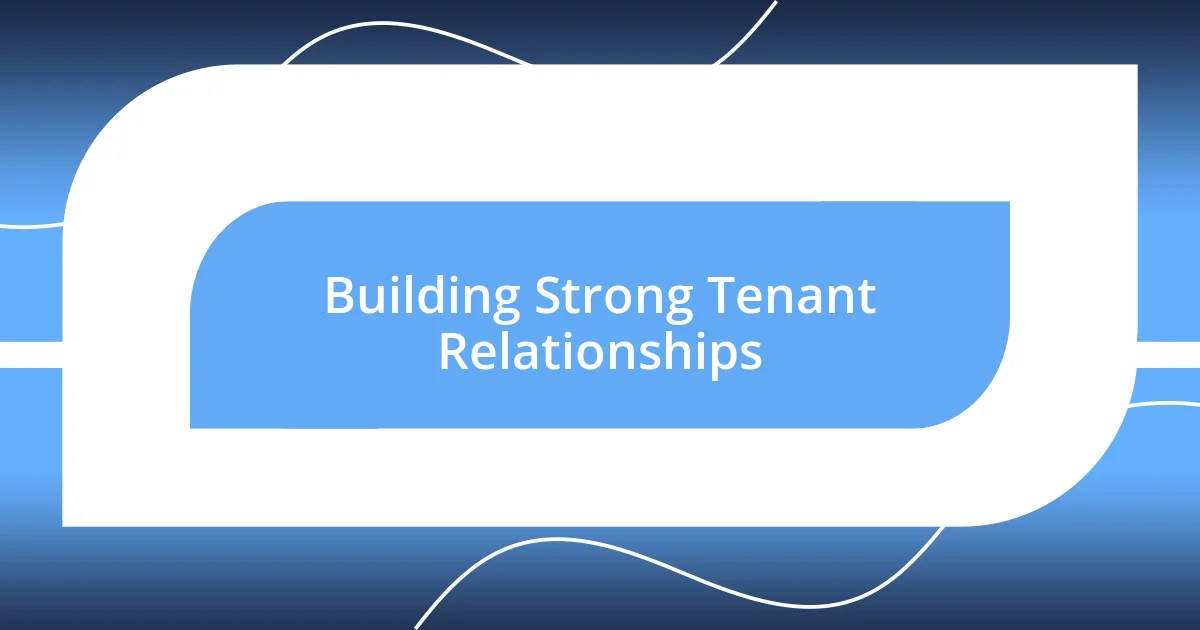
Building Strong Tenant Relationships
Building strong relationships with tenants is something I truly cherish in my property management journey. One of my first tenants, a single mother, often had questions about our policies. Rather than treating her inquiries as interruptions, I dedicated time to address each one with patience and understanding. That experience taught me that taking the time to listen and engage fosters trust, creating a supportive environment that benefits everyone. I firmly believe that when tenants feel valued, they are more likely to treat the property with respect and maintain open lines of communication.
To cultivate these strong relationships, consider the following practices:
- Regular Check-ins: I often send messages to see how things are going, which can reveal underlying issues before they escalate.
- Community Building Events: Organizing casual gatherings allows tenants to connect with each other, strengthening the community bond.
- Personalized Communication: Recognizing tenants by name and remembering personal details can make all the difference in making them feel appreciated.
- Prompt Response to Concerns: Addressing issues quickly demonstrates that I care about their comfort and well-being.
- Feedback Opportunities: I always welcome suggestions from tenants. Their insights have sometimes led to changes that enhance the living experience for everyone.
By prioritizing these strategies, I’ve witnessed how strong tenant relationships lead to happier residents and smoother property management experiences. The emotional payoff is immense—it’s rewarding to see tenants thrive in a place we can build together.
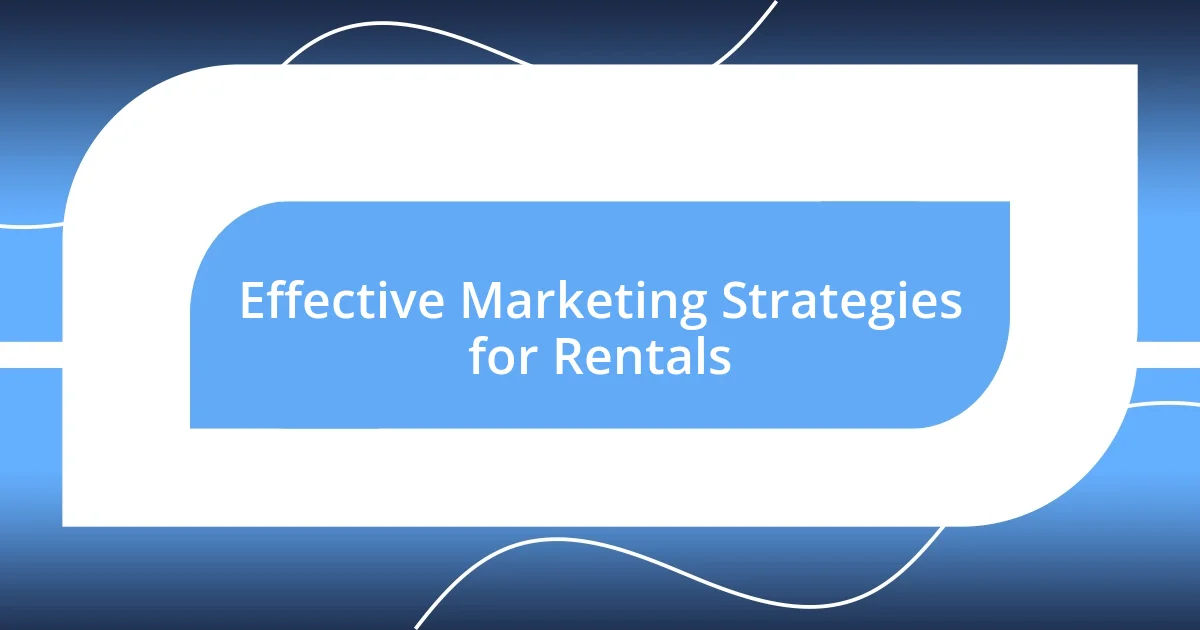
Effective Marketing Strategies for Rentals
When it comes to marketing rental properties, I’ve found that utilizing high-quality photos is non-negotiable. The first time I invested in professional photography, I was amazed at how much more interest my listings received. People are visual creatures, and captivating images can highlight the unique features of a property that words alone can’t capture. Have you ever scrolled past dull listings? It’s no surprise that properties with stunning photos bring in more inquiries—it’s all about standing out in a crowded market.
Another strategy that has proven effective for me is leveraging social media platforms. I remember creating a Facebook page for my properties, and it turned out to be a game changer. Sharing updates, engaging posts, and tenant testimonials not only keeps my current tenants informed but also attracts potential ones. Plus, using targeted ads can reach a wider audience than traditional methods ever could. Isn’t it fascinating how a well-placed post can connect you with future tenants?
Additionally, I’ve learned the power of storytelling in my listings. Each property has its unique history; highlighting the story behind the space can create an emotional connection with potential tenants. For example, I once managed a lovely Victorian house with a rich past. I shared its story in the listing and received messages from interested renters who were captivated by its charm. Isn’t it intriguing how a little background can transform a property from just another option into a home that someone seriously considers?
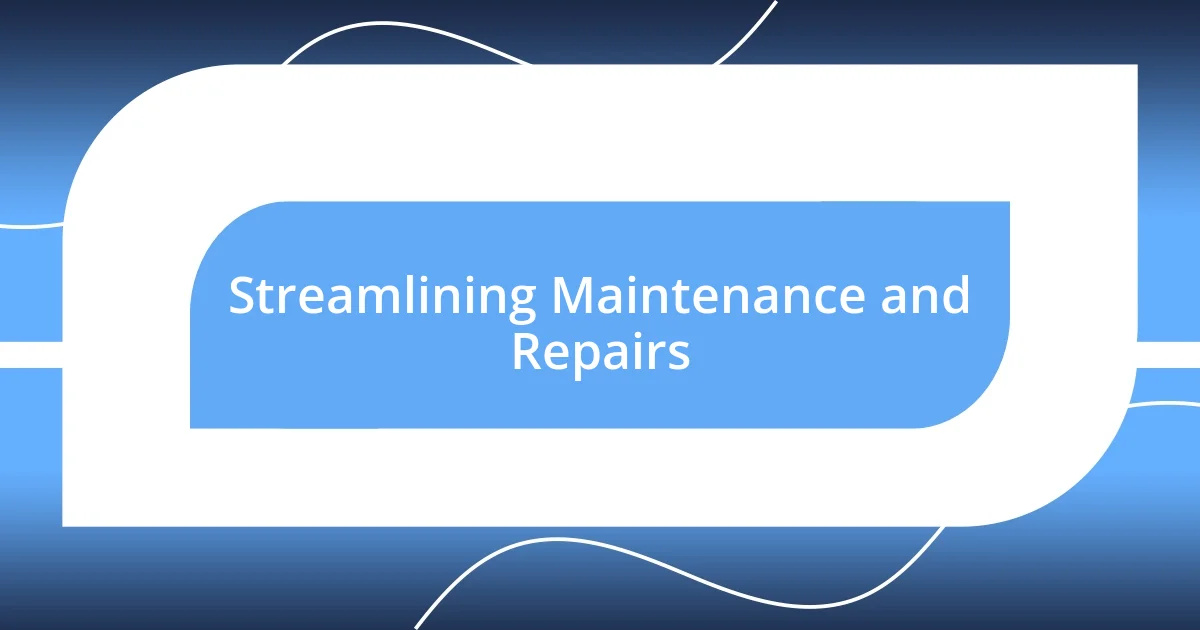
Streamlining Maintenance and Repairs
When it comes to maintenance and repairs, I can’t stress enough the importance of having a solid system in place. I remember the chaos of my early days in property management when I’d scramble to find reliable contractors on short notice. It was stressful for me—and for my tenants. Now, I maintain a roster of trusted professionals who have proven their worth over time. It streamlines the process drastically; when an issue arises, I know exactly who to call. This not only saves time but ensures that repairs are handled promptly and efficiently, which keeps tenants satisfied.
I’ve also found that using a maintenance management software has been a game changer. Early on, I used to rely on spreadsheets, which were often cumbersome and prone to error. Implementing software allows me to track requests in real-time, generate reports, and communicate directly with my tenants about progress. There was a time when I neglected to follow up on a repair request, which left a tenant frustrated. Learning from that experience taught me the value of keeping everyone in the loop. Now, when a tenant submits a request, they receive instant confirmation, and I can keep track without the risk of letting anything slip through the cracks.
Additionally, I highly recommend conducting regular property inspections. I made it a habit to visit each property every six months, which initially felt like an added task. However, I began to uncover minor issues before they developed into major headaches. For instance, I once noticed a small leak in a kitchen faucet during one of these inspections. Addressing it early saved not just costs but also the inconvenience of tenant complaints down the line. Isn’t it amazing how proactive measures can lead to fewer emergency calls and happier tenants?
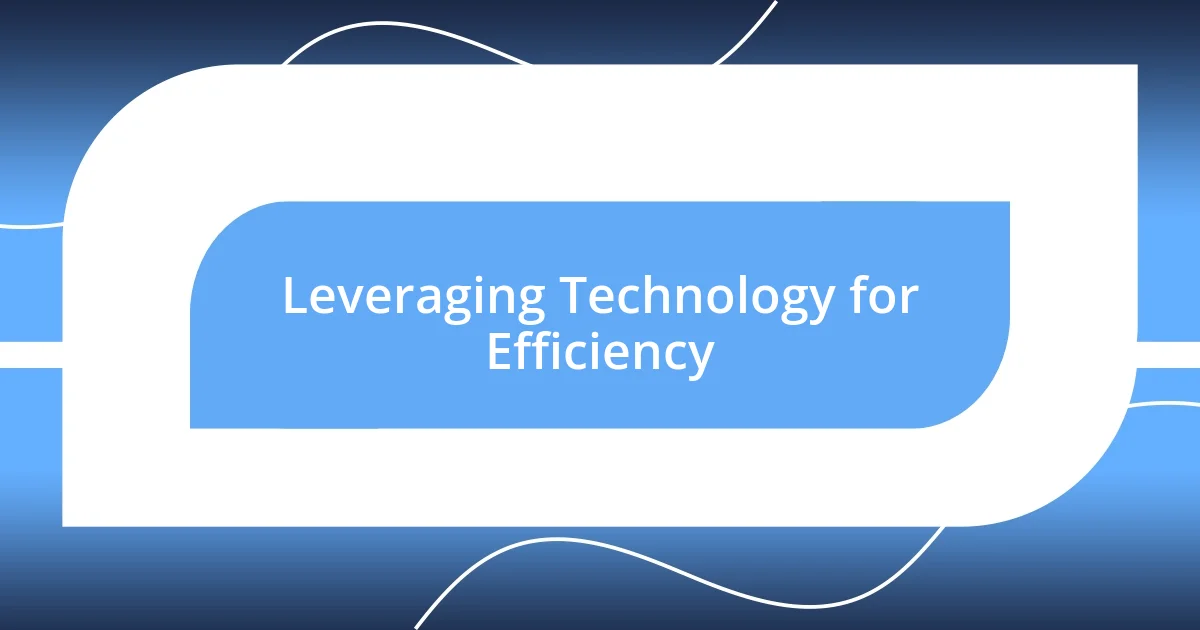
Leveraging Technology for Efficiency
Utilizing technology in property management is, in my experience, a crucial factor for achieving efficiency. For instance, I once integrated a tenant portal that allowed residents to pay rent online and submit maintenance requests with just a click. The first time I saw the decrease in late payments and the surge in maintenance requests being logged more systematically, I truly understood the impact of streamlining communication. Have you ever wondered how much smoother life could be with an organized approach?
Moreover, I’ve found that employing property management software can drastically cut down on administrative tasks. In the past, I spent hours calculating rent and tracking expenses manually, which often led to errors. After making the switch to software that automates these processes, I regained valuable time in my day. This boost in productivity not only helped me focus on strategic growth but also allowed me to provide better service to my tenants. Isn’t it empowering to realize that such tools are available to enhance our workflow and understanding of financials?
Lastly, using smart technology for security and monitoring has been a huge advantage as well. I remember the first time I installed smart locks at one of my properties; it transformed how I managed tenant access. No longer did I have to worry about misplaced keys or lockouts. Plus, the peace of mind knowing that I could grant access remotely during emergencies was nothing short of liberating. Isn’t it fascinating how a small upgrade can add so much convenience to daily operations?
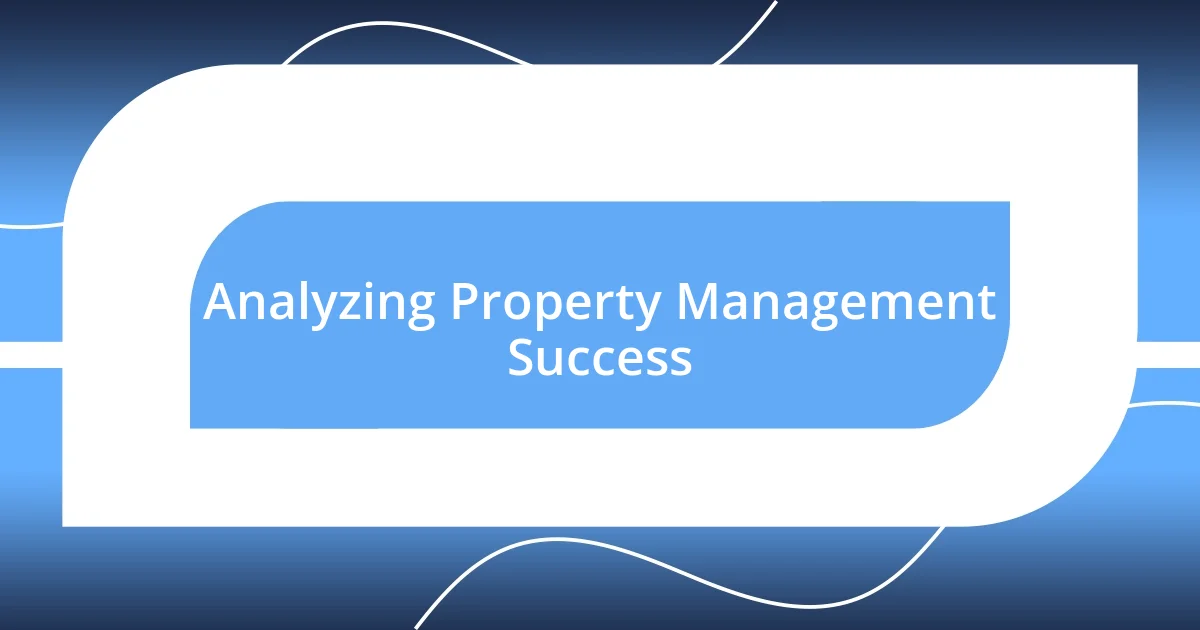
Analyzing Property Management Success
Analyzing property management success goes beyond just measuring occupancy rates or profit margins; it’s about understanding the satisfaction of both tenants and owners. Reflecting on my journey, I once calculated the impact of tenant retention. I discovered that keeping a tenant for just one extra year significantly reduced the costs associated with turnover. That realization opened my eyes to how important it is to foster a welcoming and attentive environment. How often do we consider that emotional connection in numbers?
I’ve also learned that evaluating communication effectiveness is a key success metric. Early in my career, I noticed that unanswered emails often led to dissatisfaction. Now, I prioritize responsiveness. I’ve set a personal goal to reply to all tenant inquiries within 24 hours. That small commitment not only reduces misunderstandings but also significantly boosts tenant morale. When was the last time you felt valued because someone simply acknowledged your concerns?
Finally, I regularly assess my overall management strategies through tenant feedback. After conducting an anonymous survey last year, I was surprised to hear that many tenants valued community engagement as much as maintenance. I realized that hosting occasional events could foster a sense of belonging and loyalty. Isn’t it interesting how sometimes the most profound insights come from simply asking? Recognizing these dimensions allows me to refine my approach and fosters a more thriving living space for everyone involved.









